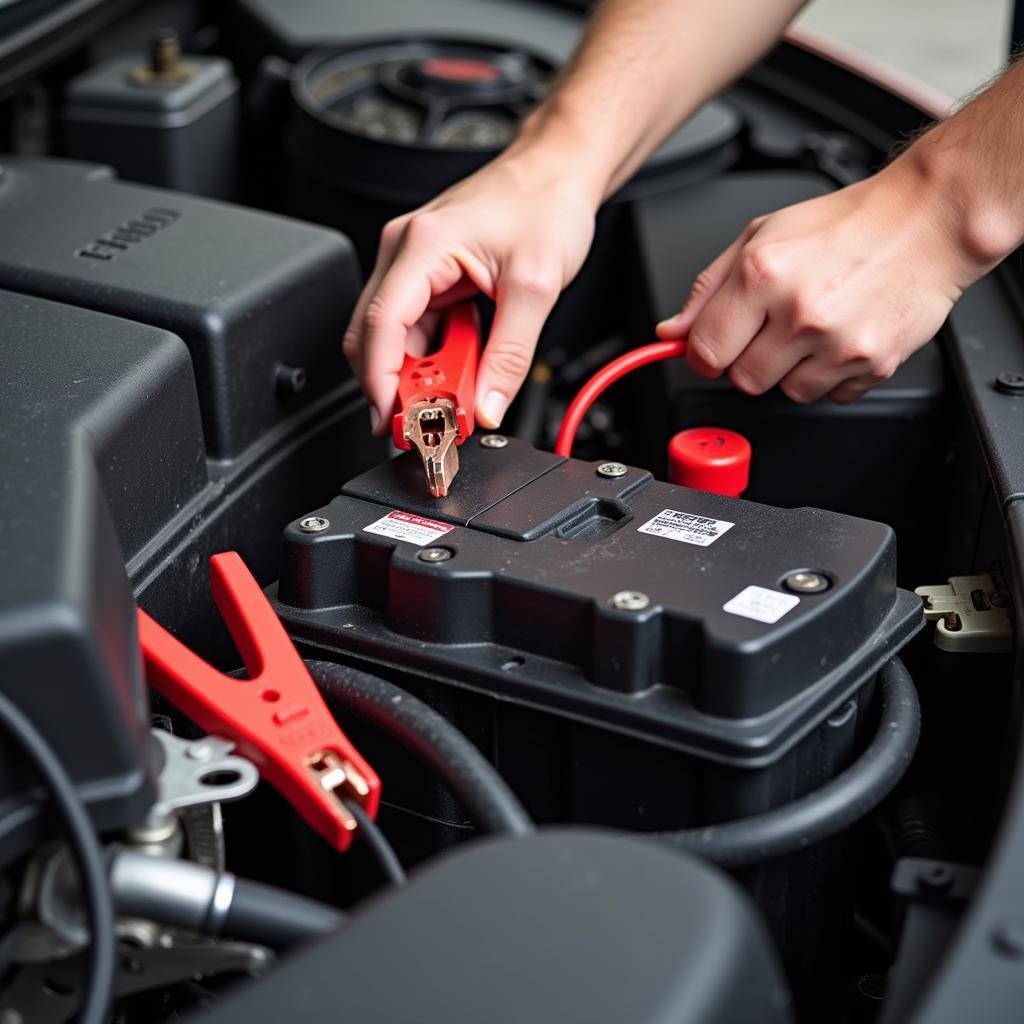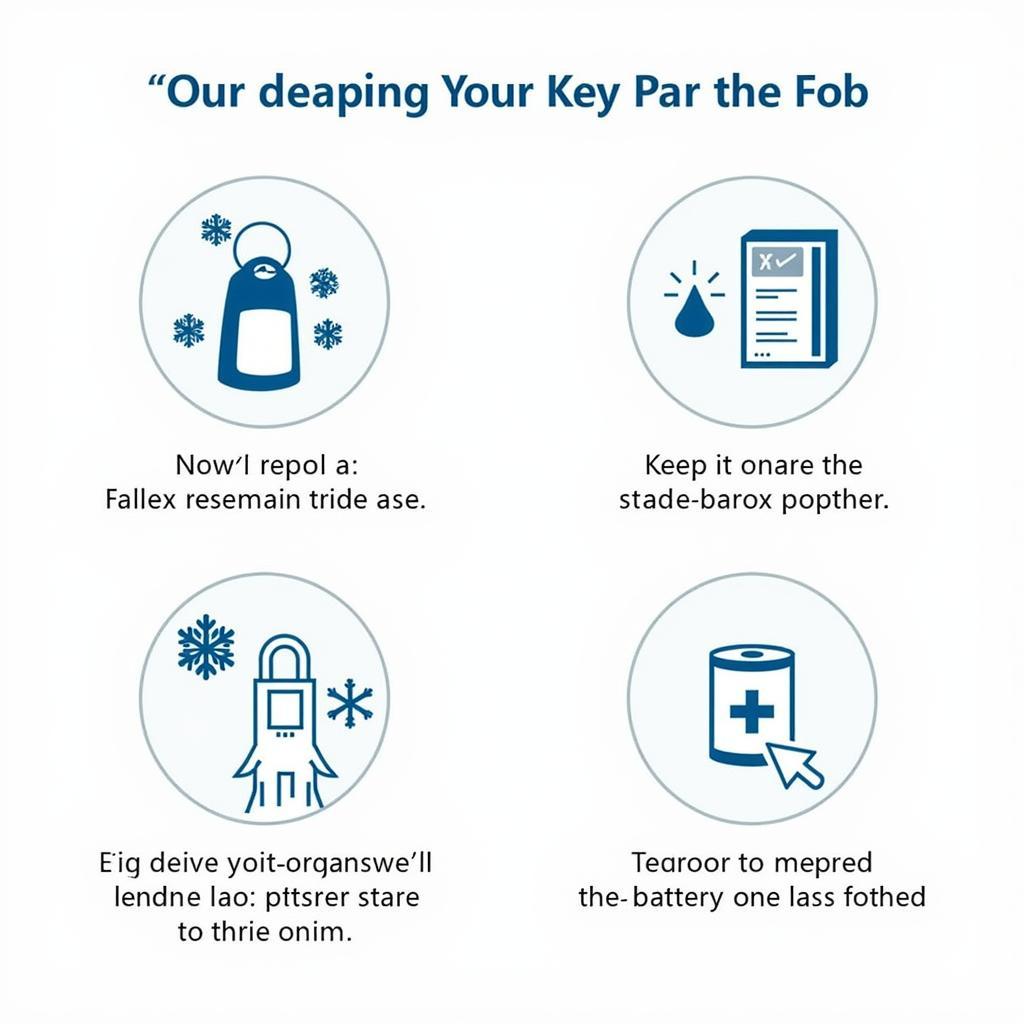A dead car battery is a frustrating experience, leaving you stranded and needing a jump start. Understanding the causes of a dead battery in car can help you prevent future occurrences and maintain your vehicle’s electrical system. This guide dives deep into the various reasons why your car battery might die, offering solutions and preventative measures.
 Jump starting a dead car battery
Jump starting a dead car battery
Common Causes of Dead Battery in Car
Several factors can contribute to a dead battery. Some are obvious, while others are less apparent. Here’s a breakdown of the most frequent culprits:
- Leaving lights on: This is a classic cause. Even interior lights can drain enough power overnight to leave you with a dead battery in the morning.
- Extreme temperatures: Both extreme heat and cold can significantly impact battery performance. Heat can evaporate battery fluid, while cold can slow down chemical reactions within the battery.
- Old age: Car batteries have a limited lifespan, typically 3-5 years. As they age, their ability to hold a charge diminishes.
- Parasitic drain: This occurs when electrical components continue to draw power even when the car is off, slowly draining the battery. Common culprits include faulty door switches, glove box lights, or aftermarket accessories.
- Short trips: Short drives don’t give the alternator enough time to fully recharge the battery after starting the engine, leading to a gradual discharge over time.
- Corroded terminals: Corrosion on battery terminals can impede the flow of electricity, preventing the battery from charging properly and the car from starting.
How to Diagnose a Dead Battery in Car
Identifying the cause of your dead battery requires some investigation. Here’s a step-by-step guide:
- Check the obvious: Look for any lights left on, inside or outside the vehicle.
- Inspect the battery terminals: Look for corrosion or loose connections. If you find smart car battery dead, check the connection first.
- Test the battery: Use a multimeter to measure the battery voltage. A fully charged battery should read around 12.6 volts. A reading significantly lower indicates a problem.
- Check the alternator: A failing alternator won’t charge the battery properly. Have it tested at an auto parts store or repair shop.
- Look for parasitic drain: If none of the above reveals the cause, you may have a parasitic drain. This requires more advanced diagnostic tools. If you have a fiat 500 battery dead, consider parasitic drain as a possible reason.
Preventing a Dead Car Battery
Preventing a dead battery is much easier than dealing with the consequences. Here are some preventative measures:
- Turn off all lights: Double-check that all lights are off before leaving your car.
- Limit short trips: If possible, combine errands to give your alternator sufficient time to recharge the battery.
- Clean battery terminals: Regularly clean battery terminals with a wire brush and baking soda solution. You can check battery key fob nissan altima for related information.
- Park in a garage: If possible, park in a garage to protect the battery from extreme temperatures.
- Have your battery tested regularly: Get your battery tested at least once a year, especially if it’s more than three years old. Understanding the battery sign in car dashboard is also helpful in monitoring your battery’s health.
Sometimes, even with precautions, you might find your car’s anti-theft system activated, leading to a dead battery. Knowing how to get car out of anti theft mode deactivated is useful in these situations.
Conclusion
A dead car battery can be a major inconvenience. By understanding the causes of a dead battery in car and taking preventative measures, you can significantly reduce the risk of finding yourself stranded. Regular maintenance and a little awareness can go a long way in keeping your car running smoothly.
FAQ
- How long does a car battery last? Typically, 3-5 years, but this can vary depending on usage and climate.
- Can I jump start my car myself? Yes, but it’s important to follow safety precautions.
- What are the signs of a failing alternator? Dim headlights, flickering dashboard lights, and a whining noise from the engine are common signs.
- How can I prevent parasitic drain? Regularly inspect and maintain electrical components, and have a professional diagnose any suspected drain.
- Is it bad to leave my car unused for a long time? Yes, it can lead to a dead battery. Consider using a trickle charger if you plan on storing your car for an extended period.
- What should I do if my car battery keeps dying? Consult a qualified mechanic to diagnose and address the underlying issue.
- Can extreme temperatures damage a car battery? Yes, both extreme heat and cold can shorten a battery’s lifespan.


